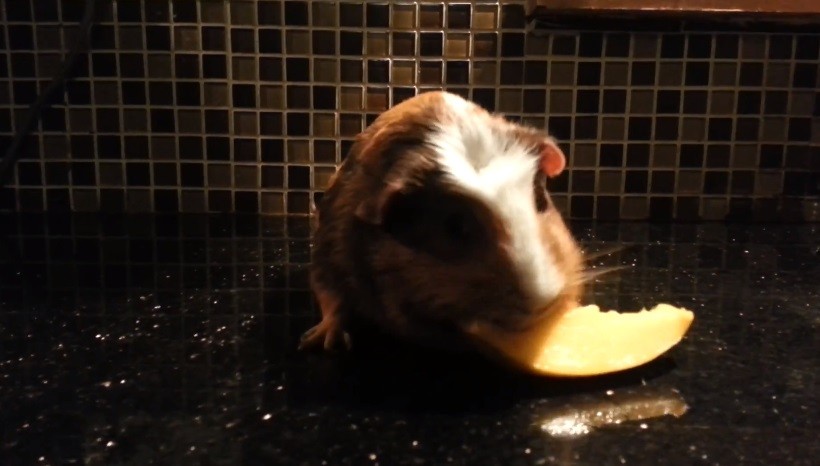Yes, you can feed your guinea pig mangoes. They need vitamins C and A, which mangoes provide. Scurvy can strike Guinea pigs since they cannot make their own vitamin C. Mangoes are a great supplement to your pet’s diet in this regard. Fruits such as mangoes are rich in antioxidants that battle free radicals, which can harm their cells and perhaps cause cancer. Giving mangoes to your Guinea pig will make it very happy. Mango’s high sugar content should be viewed as a rare pleasure, as it can be dangerous if consumed in big quantities.
Nutritional Facts of Mangoes
When the mangoes are fully ripe, it is extremely sweet and delicious and is one of the most popular fruits. Fruits like mangoes have a larger calorie count than other fruits, although they’re very nutrient-dense. Mangoes are a good source of folate, as well as vitamin C and vitamin E. One cup of raw mango chunks has 99 calories, 1.4 grams of protein, and 25 grams of carbohydrates, with only 0.06 grams of fat (165 g).
Below is a list of the USDA’s nutritional data of mango.
Can Guinea Pigs Eat Mango Skin?
No, guinea pigs cannot consume mango peel. Guinea pigs who chew the mango skin improperly may choke on the hard, due to its fibrous texture. It is also possible to feed guinea pigs chewable dried mangoes with the skin on, still the sugar content is harmful to them. There is no better way to protect your guinea pig’s health than to avoid mango skin. Ingesting mango skin is not suggested because of its harsh and solid texture. Therefore, you shouldn’t give it to the pet as It has no positive outcome.
Is it bad to eat mango skin? Indeed, guinea pigs should not eat the skin of mango since it is toxic. Pesticides and other contaminants may be sprayed on mango skin, posing a serious health risk.
Does Mango Cause Diarrhea?
Yes, if it is not prepared, served, and monitored properly, it can be dangerous to your guinea pigs’ health. When eaten in excess, fiber-rich fruits such as mangoes can cause diarrhea. We, therefore, urge that you should allow your pet to consume this fruit sparingly.
If the portions are too large, your guinea pig could choke. Too much mango can potentially be a health hazard. If left untreated by your veterinarian, gastrointestinal abnormalities such as diarrhea or decreased appetite can progress to more significant health problems.
Do Guinea Pigs Like Mangoes?

Yes, Guinea pigs appreciated the taste of mangoes because it is soft and sweet. Your Guinea Pigs can safely consume fresh, raw mangoes. A variety of nutrients, minerals, and vitamins may be found in mangoes, all of which are excellent for your pet’s health.
Due to the high sugar content of mango, you should only give your Guinea Pig modest amounts. You only need one or two small cubes per week for your pet. If you’re going to feed guinea pigs mango, make sure to clean it thoroughly, remove the skin, and chop it into little cubes.
Can guinea pigs have mangoes? Mango is one of the delicious fruits that guinea pigs may consume, along with many other fruits. Only fresh mangoes, not canned or otherwise processed, should be given to your guinea pigs as a rare treat.
Do Guinea Pigs Like Mangoes Leaves?
Guinea pigs receive no benefit from mango leaves, and they may even make them sick. A variety of lush green vegetables and various leaves are enjoyed by Guinea pigs. While some Guinea pigs like eating the leaves, others prefer the real fruit.
As urushiol is present in mango leaves, guinea pigs should not be fed it. This substance is harmful to people with allergies because of the presence of certain allergens. Hazardous mango leaves can irritate their skin, mouth, and stomach among other parts of their bodies.
Can Guinea Pigs Eat Mango Seeds?
Do not give mango seeds to your pet. As a result of their hardness and slickness, your pet is at grave risk. Providing seed is never a bright idea for your guinea pigs. These seeds can cause injury or even death to Guinea Pigs if they are gulped by them.
In addition to mango seeds, cavies do not tolerate them. Mango seeds must be removed before feeding mangoes to guinea pigs.
Serving Size Of Mangoes To Guinea Pigs

Finding out how to correctly feed your Guinea pig is an important part of the process. Mangoes that aren’t entirely grown and sweet can create major health concerns in Guinea pigs, as sour fruit can cause serious health issues in the animals. Always feed a few chunks of mangoes once or twice a week to your guinea pigs. Mangoes should be thoroughly cleaned.
If pesticides or other chemicals were used during harvesting, the skin should be removed. Consumption of any hazardous substances can result in serious health problems. Peel off as much of the mango’s skin as you can before storing it. Chop the mangoes finely before feeding.
Guinea pigs must get enough vitamins and minerals from the fruit, while also avoiding diseases caused by its high sugar content, in the prescribed diet.
Dietary Hull accounts for 80 percent of the diet, with the remainder, made up of fresh fruits and vegetables up to 10 to 15 percent. More Hay, some vegetables, and frequent treats such as mangoes are necessary for optimal Guinea pig care.
Can Guinea Pigs Eat Dried Mango?
Guinea pigs cannot eat dried mangoes. It is impossible to get any nutrition from dried mangoes. Despite their excellent nutritional value, dried mangoes are high in sugar, which is bad for your pet’s health.
You should avoid giving your Guinea pigs dried mangoes since they contain preservatives. Guinea pigs should only be fed fresh and raw fruits and vegetables, as their digestive system is unable to process dried ones.
Health Benefits Of Mangoes
Calcium
Mangoes contain a small quantity of calcium. When it comes to their bones, guinea pigs need the correct quantity of calcium, especially females who are pregnant. Dietary calcium and phosphorus are necessary for bone and tooth formation, as well as other nervous system requirements. They may suffer health problems too from eating calcium-rich foods.
Antioxidant
Nutrient- and antioxidant-rich mangoes can help minimize the risk of cancer and other potentially fatal disorders. It is well known that antioxidants fight free radicals, minimizing cell damage. Theoretically, a guinea pig with less cell damage could heal faster from an injury.
Vitamin C
Guinea pigs require enough vitamin C, which mangoes give. A strong immune system depends on vitamin C, which your guinea pigs can’t produce on their own. Guinea pigs suffering from vitamin C deficiency, such as scurvy, are susceptible to a variety of diseases and health difficulties.
Vitamin A
Mangoes are a wonderful source of vitamin A, all of which aid in the growth and metabolism of your guinea pigs. Mango has a lot of lesser-known health benefits. Gnu pigs require vitamin A to grow and develop properly. To keep their eyes healthy, they’ve been fitted with special goggles that guard against Xerophthalmia and corneal disease. However, deficient vitamin A animals die within a few days of diagnosis.
Side Effects Of Mangoes
Obesity
Guinea pigs are prone to obesity and diabetes if they eat too much sugar. Because they are still unable to adequately digest the nutrients, your guinea pig should consume fewer mangoes to avoid obesity.
Excess Sugar
Mangoes have a higher sugar content than other fruits. Even though our guinea pigs become happy for the great time. Because of guinea pigs’ insatiable appetites, we tend to overfeed them. Unhealthy conditions such as obesity, diabetes, and diarrhea are also caused by a high-sugar diet.
Allergic Reaction
Mangoes have unclean oils in some areas of the fruit. Allergy symptoms include nausea, vomiting, and sneezing. If you come across any of these, you should seek the help of a professional as soon as possible. Your small friend is at risk because of the information provided. To avoid putting guinea pig’s lives at risk, such delicacies are often studied before being offered to them.
Kidney Problems
If a high quantity of mangoes was consumed at a time by Guinea Pigs, phosphate rocks are formed when calcium crystallizes in the urine. These stones are both painful and unappealing to look at. Peeing problems that aren’t properly treated can be fatal for your Guinea Pig if left untreated.
Conclusion
Mangoes are a tasty treat for your pet guinea pig. It contains considerable amounts of Vitamin C, which Guinea Pigs cannot make themselves. Fresh mangoes should round out the rest of his weekly diet, as well as adequate amounts of hay.
Mangoes are rich in vitamins and minerals that guinea pigs need to be healthy and happy to survive. On top of that, it is high in sugar and can lead to illnesses in Guinea Pigs. Don’t feed dried mangoes and seeds to your guinea pig, and you’ll both be happy.